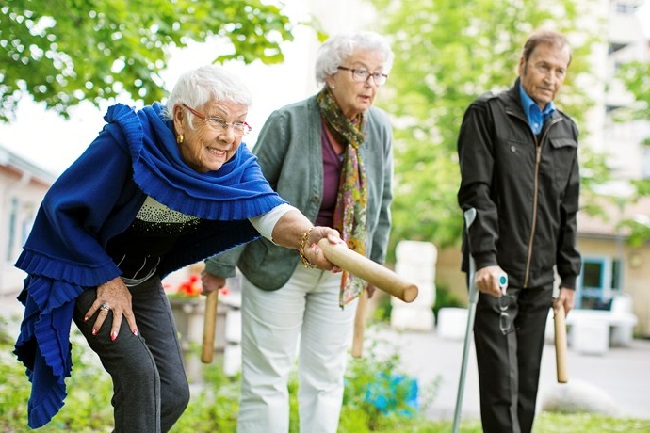Swedish initiatives for the rights of older people

An older man with two older women actively playing a game. The objective has been for older women and men to be able to lead an active life and exert influence in society
Photo: Maskot/Folio
On 31 October, the government sent the Swedish report ‘National follow-up of the regional implementation of the Madrid International Plan of Action on Ageing (MIPAA) in Sweden’ to the United Nations Economic Commission for Europe (UNECE).
“People do not become more alike simply because they get older. We continue to have different interests. Our needs continue to be individual. A modern policy for older people must not only take this into account – this must be an obvious starting point that informs this policy. The rights of older women and men must be in focus when we develop care for older people in Sweden,” says Minister for Children, the Elderly and Gender Equality Åsa Regnér in connection with Sweden having now submitted the report.
The Madrid International Plan of Action on Ageing (MIPAA) is a UN global action plan that highlights the rights of older people. The MIPAA encourages Member States to draw attention to and take measures to strengthen the rights of older people – against the background of the global challenge of an ageing population.
The MIPAA was adopted in Madrid in 2002 and is followed up every five years; Sweden presented its report to the UN Economic Commission for Europe in October. A global report will subsequently be submitted to the Commission for Social Development in New York.
The report describes the measures taken in Sweden in 2012–2016 to strengthen the rights of older women and men.
To cover the breadth of the initiatives carried out, a number of government agencies and ministries have been involved in reporting, as have representatives of pensioners’ organisations.
An active life and influence in society
The report to the UNECE contains facts and data that can be used by the government and others in efforts to develop policy for older people and plans to meet the needs of older women and men, now and in the future.
Noteworthy in the Swedish report is that Sweden, compared with other OECD countries, has an ageing population with a large proportion of people over 80, but also that these older people are relatively healthy.
The government has carried out several initiatives based on a rights perspective. The objective has been for older women and men to be able to lead an active life and exert influence in society and their own everyday lives, to be able to age in security, retain their independence, be met with respect and have access to good health and social care.
One example is increased staffing levels in care for older people. Staffing is crucial for the quality of care. The government allocated SEK 1 billion (about $108m) for 2015 and has allocated SEK 2 billion per year to the municipalities for 2016–2018 for increased staffing levels in care for older people.
As a supplement to increased staffing levels, the government has also set aside SEK 200 million this year for a training initiative targeting support staff in care for older people and people with disabilities.
To create long-term planning conditions for municipalities and county councils, the government will allocate an additional SEK 10 billion per year to the municipal sector for 2017 and onwards. This money will strengthen welfare and develop the Swedish model.
Investment grant for housing for older people
Sweden’s population is increasing dramatically and the need for housing has increased considerably. The government has introduced a new investment grant for housing for older people. This grant is to stimulate the reconstruction and new construction of housing for older people. The aim is to improve accessibility and encourage older people to continue to live in their own homes. This year, the government has allocated SEK 150 million for this purpose.
Swedish Government

